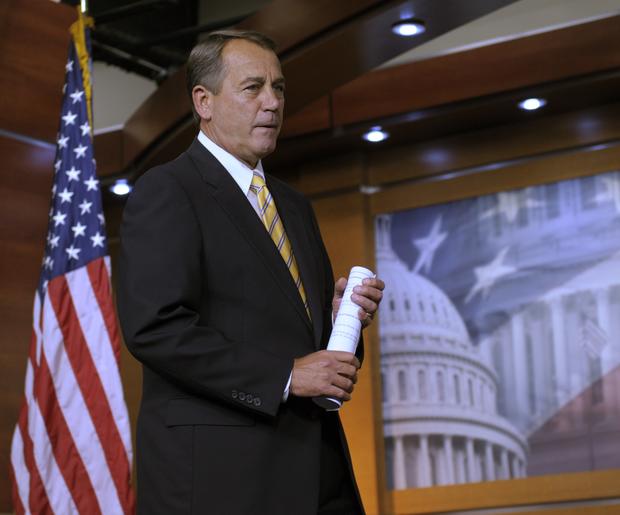Last-ditch GOP debt plan emerges
Updated 5:09 p.m. Eastern Time
With skittish markets preparing for the possibility of economic catastrophe, lawmakers worked behind closed doors Monday to craft dueling plans that they hope could somehow, someway get a polarized Washington to pass an increase in the debt limit.
House Speaker John Boehner (pictured), who walked out of negotiations with the White House Friday, presented his caucus Monday afternoon with a nearly $3 trillion package that broke the process into two parts.
The plan mandates immediate cuts and caps in discretionary spending, potentially saving $1.2 trillion over a decade. (The nonpartisan Congressional Budget Office has yet to score the proposal.) In exchange, the debt ceiling would be raised by less than $1 trillion, enough to last the nation through the end of the year. The as-yet-unspecified spending caps would trigger automatic across-the-board spending cuts if not met.
The plan creates a 12-member "Joint Committee of Congress" that would additionally identify $1.6 to $1.8 trillion in deficit reduction over a decade. The House and Senate would consider those savings in an up-and-down vote, without amendments. If the plan passes, President Obama could then request a separate, $1.6 trillion debt limit increase.
The proposal would also require the House and Senate to vote on a Balanced Budget Amendment by the end of the year.
"I think it would be irresponsible for the president to veto such legislation because it is a commonsense plan and it would avoid default," Boehner said at a press conference formally unveiling the legislation Monday afternoon.
House Republicans floated the possibility of a two-step plan over the weekend, and Democrats promptly pronounced it a non-starter. Following a White House meeting with Mr. Obama Sunday night, Senate Majority Leader Harry Reid said, "Speaker Boehner's plan, no matter how he tries to dress it up, is simply a short-term plan, and is, therefore, a non-starter in the Senate and with the president."
UPDATE: Reid has since unveiled a Senate Democratic plan. Read about it here.The White House says a short-term plan is unacceptable because it would create uncertainty and result in another bruising debt limit fight six months from now. Republicans have countered by casting the Obama administration's insistence that any deal last "through the election" as evidence that its posture is driven by political considerations.
"I know the president's worried about his next election," Boehner said on "Fox News Sunday." "But my God, shouldn't we be worried about the country?"
The Senate Democratic plan includes roughly $2.7 trillion in deficit reduction without tax increases or cuts to entitlement programs. House Republicans have vowed to oppose any deal that would raise taxes, while many House Democrats have chafed at the idea of a deal that includes major cuts to Social Security, Medicare or Medicaid. The debt limit would also be increased by enough to last through the end of 2012.
It isn't easy to find $2.7 trillion in spending cuts, however, and Reid's plan relies heavily on savings from the expected drawdowns in Iraq and Afghanistan. It's not clear that Republicans will accept such savings as spending cuts, though it's worth noting such savings were included in the House Republicans' budget blueprint passed in April. And Reid's plan, which has White House backing, abandons Democratic efforts to include revenue increases in a deal as part of a grand compromise.
Boehner said Monday that the Democratic plan is "full of gimmicks."
And during a closed-door meeting with his caucus, he suggested the votes are not there to pass the Reid plan. He said the GOP plan has the necessary votes and that the president will thus be forced to sign their plan. Boehner also called on his caucus to stick together to achieve Republican goals.
That's not happening. In a statement Monday afternoon, Republican Study Committee Chairman Jim Jordan said he opposed the Boehner plan, saying "only a Balanced Budget Amendment will actually solve our debt problems."
The Obama administration has said that without congressional action, the U.S. will breach its limit on borrowing next Tuesday, August 2. That could cause the U.S. to default on its debt as well as a host of other negative outcomes, including the suspension of Social Security checks, military pay and other obligations, and potentially cause global financial chaos.
Credit ratings agencies have warned that they are poised to withdraw the United States' triple-A credit rating without guarantees that it will not default, and they have also suggested that the credit rating is in danger without a significant deficit reduction effort. That would potentially mean an increase in the cost of borrowing both for the U.S. government and for Americans seeking home and car loans and a higher interest rate for those seeking to pay off credit card debt.
President Obama plans to address the nation about the ongoing debt limit fight at 9 p.m. Eastern Time Monday evening.
